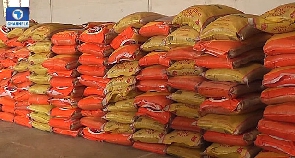Business News of Friday, 2 July 2021
Source: thenationonlineng.net
Nigeria has 1.2m metric tons rice deficit
The African Agricultural Technology Foundation (AATF), yesterday said Nigeria still has a deficit of about 1.2 million metric tons of rice which the country’s production has not been able to meet.
This was made known at the Annual Review of the Nitrogen Efficient Water Efficient Salt Tolerant (NEWEST) rice project in Abuja.
This rice variety also called Nitrogen Use Efficient (NUE12) allows the plant to make use of limited nitrogen in the soil, resist drought and withstand salty soil.
The NEWEST rice has undergone confined field trials at the National Cereal Research Institute, Badeggi, Niger State and a dossier is being prepared to be sent to National Biosafety Management Agency (NBMA) for permission for a National Performance Trial.
Read Also: FACT-CHECK: A bag of rice is indeed more than Nigeria’s minimum wageThe project is being carried out by AATF, National Cereals Research Council of Nigeria (NCRI), Agricultural Research Council of Nigeria (ARCN) and other partners.
The Project Manager for AATF, Dr Kayode Sanni said the conventional rice varieties in the country have low yield per hectare.
Dr Sanni who is also the leader for Alliance for Hybrid Rice in Africa, based in Nairobi, Kenya said the Review meeting will initiate the dossier preparation for submission to the NBMA for approval.
He said: “What we have done is that we have developed rice that can actually grow under low nitrogen and still give a very good yield.
“From the observation and what has been happening in Nigeria, the production of rice has gone up a bit. As at 2015, we are about 3.9 million metric tons, and by 2019, we moved to about 4.5 million metric tons.
“However, we still have a deficit of about 1.2 million metric tons which our production have not been able to meet, and in order to meet that, we will we import.
“The productivity or the yield is low compared to what Global is, the average yield is about 2.2 tons per hectare, that does not say there are no area where you have yield up to five tons per hectare, but when you take the average across it’s about 2.2 tons compared to the global average yield which is about 4.3 tons per hectare.”
Also, the Director-General, National Biotechnology Development Agency (NABDA), Prof Abdullahi Mustapha said the country is losing billions of naira annually owing to the massive importation of rice.
He said a lot of jobs are lost because of Nigeria’s inability to produce enough rice.
“Nigeria is moving forward in the area of development of climate smart crops and NABDA is among the front liners.
“The application of biotechnology tool to improve the quality of our local rice seeds will lead to tremendous avalanche of wealth, job creation and healthier environment,” he said.
Furthermore, Executive Director of NCRI, Dr Aliyu Umar said the project will contribute immensely to the economic growth of Nigeria while addressing certain key issues of environmental safety due to appropriate nitrogen fertilizer use.











